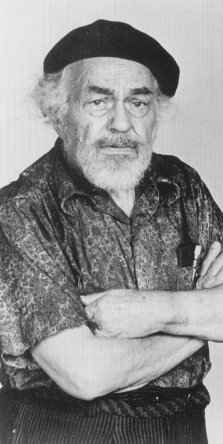Edward G. Robinson and

|
Sol Roth is a relatively weak character in the film: he feels guilty at having done nothing to stop the world becoming as it is, and rather than face up to his current problems he chooses suicide. In one of his last interviews, Robinson said: "My character is a weak liberal who hasn't done enough to stop the rot in society." Robinson himself was not a weak character, and his political activities had almost ruined his career during the McCarthy 'witch hunts' when Ronald Reagan, then head of the actors union, was exposing 'communist' writers, directors and actors in Hollywood. Robinson found it difficult to find work for some years afterward. During the making of Soylent Green, on 10th October 1972, producers Walter Seltzer and Russell Thacher threw a party in Robinson's honour on MGM's Stage 20, the theme being his 'second hundred films.' Edward G. Robinson died of cancer on the afternoon of 26th January 1973. Soylent Green was released later that year, to moderate box office success. The Hollywood Reporter said the film "provides Edward G. Robinson with as moving a screen farewell as any actor ever had." Alan L. Gansberg in Little Caesar - Edward G. Robinson: a Biography wrote: "The image of a thin, bearded, pale Edward G. Robinson on a stool, one of the publicity photos from Soylent Green, remains his farewell." In his book The Actor's Life: Journals 1956 - 1976, Charlton Heston writes of Soylent Green: "The film is very good, not least because of Eddie Robinson's superb performance. He knew while we were shooting, though we did not, that he was terminally ill. He never missed an hour of work, nor was late to a call. He never was less than the consummate professional he had been all his life. I'm still haunted, though, by the knowledge that the very last scene he played in the picture, which he knew was the last day's acting he would ever do, was his death scene. I know why I was so overwhelmingly moved playing it with him." |
 Soylent Green was Edward G. Robinson's 101st movie, he was paid
$650,000 to appear as Sol Roth. He played the part in a beret, patterned shirt and beard, and his
own pale and thin appearance - a result of his illness - leant a special sympathy to the part of
the old man who remembered the good old days. Robinson's performance, his final movie appearance,
is one of the highlights of the film.
Soylent Green was Edward G. Robinson's 101st movie, he was paid
$650,000 to appear as Sol Roth. He played the part in a beret, patterned shirt and beard, and his
own pale and thin appearance - a result of his illness - leant a special sympathy to the part of
the old man who remembered the good old days. Robinson's performance, his final movie appearance,
is one of the highlights of the film.